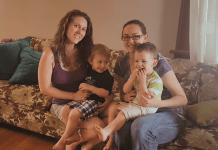
When my husband and I experienced our first pregnancy loss at five weeks along, it was hard, to say the least. We hadn’t been trying too long, three months. Our first loss occurred before we had any children in our home, so if by chance you’re a man reading this with a similar experience or you’re a mama who doesn’t feel as if her male spouse truly understands, that makes sense. You are normal and not alone if you’re experiencing any concern with growing your beautiful family. Here are some ways you can help or support a mom with pregnancy loss and/or infertility.
I didn’t know how I help or support.
All I knew is that I had already mapped out the month my baby would arrive and had created a rather extravagant way in which to tell my husband the happy news.
When my husband thinks back on this event, he would also tell you he didn’t feel the loss quite as deeply as I did. To tell the truth, I’m not sure I actually felt the loss on a deep emotional level until some time later. What I felt at the moment was intense fear and anxiety that we were truly going to struggle to have children. I was so mad.
My second loss is a different story. By this point, we had one beautiful child. My husband grew in ways I never knew possible as a father. He grieved deeply with me.
And still, mamas experience this loss on a different level.
During my discussion with the women I referenced in prior blog posts, we talked about how best to support someone experiencing pregnancy loss and/or infertility issues.
The biggest help or support is to simply check in with them.
PLs and infertility tend to get lost in the shuffle amidst questions of “When are you having another?” or “Are you guys trying?” While these questions are intentionally innocent, they’re unintentionally hurtful. Be more intentional with your questions, “Are you wanting to have (more) children?”
When people ask, tell them the truth.
The truth both stops the hurtful questions and bolsters your support system. Including people in your journey helps you feel better, not worse. When someone does tell you their story, be intentional about checking in with them. Set a reminder if you have to, but be sure to let them know you’re there for them. When you share your trials, you will find that other people have had similar experiences, and you are not alone.
While it’s easy to be told not to worry, that is exactly what I and my friends are here to tell you.
With every story, it all works out in the end. Amber, who will be meeting her daughter via adoption in the coming weeks, feels this way about her journey as well. She believes adoption is what God has called her to do. This may not have been an easy or welcome thought at first, but it is one she accepts wholeheartedly now.
Lastly, the gals want you to know that in times like these, it is easy to turn away from your faith. However, each person, myself included, found that embracing a cornerstone of faith was what emboldened our spirit through it all.
No matter what, keep your faith.
I also reached out to my best friend for her thoughts. My person, believe it or not, had no idea how to help or support me either. It actually caused a bit of a rift between us. I can tell you whatever was found lacking the first time around did not happen again during my second loss. My rainy day friend expressed she felt immense guilt at not knowing how to support me during my first pregnancy loss, both at the moment, after, and today. We have moved on, we love each other, I’ve done things that I’ve apologized for, too. But she feels deeply for me, and whether I like it or not, this is an emotion she re-experiences whenever this topic is broached.
I tell you this to encourage you to find immense depths of forgiveness in your heart for anyone who has failed to help or support you during your journey. Our culture has not prepared us for how to help others grieving pregnancy loss/infertility. It may be challenging, at the same time, if you express how you’d like to be supported, you will be ten times as likely to receive the support you need.
Keep it simple: ask for a hug, sit in silence, make a plan for daily check-in.

















